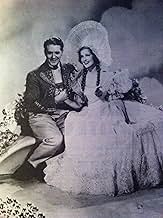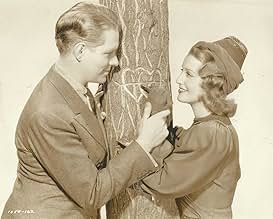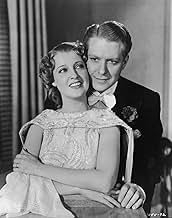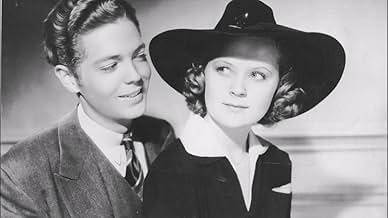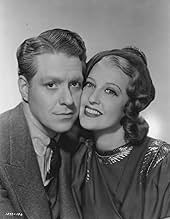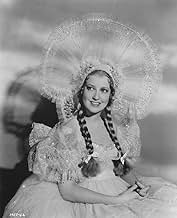VALUTAZIONE IMDb
6,2/10
767
LA TUA VALUTAZIONE
Aggiungi una trama nella tua linguaThe team behind a successful Broadway production tries to stop the married stars from transitioning to Hollywood.The team behind a successful Broadway production tries to stop the married stars from transitioning to Hollywood.The team behind a successful Broadway production tries to stop the married stars from transitioning to Hollywood.
- Regia
- Sceneggiatura
- Star
- Candidato a 2 Oscar
- 5 vittorie e 2 candidature totali
Recensioni in evidenza
MGM spared no expense in dressing up the sets and costumes for an opulent technicolor musical starring America's singing sweethearts, Jeanette MacDonald and Nelson Eddy. They even included a witty script by Dorothy Parker, songs by Victor Herbert and a supporting cast that included Frank Morgan, Ray Bolger, Reginald Gardiner and Allyn Joslyn. But changing tastes have made this one questionable material for today's audiences.
This time the stars are not in period costumes. The story is a contemporary one about two stage stars tired of appearing for the sixth straight year on Broadway in a musical called "Sweethearts" who decide to give Hollywood a try. Plot complications occur when blustery Frank Morgan uses trickery to make Jeanette believe Nelson is cheating on her. Everything is straightened out for a happy ending that reunites the two stars and has them both returning to the Broadway scene where their hearts truly lie.
Fans of the famous duo will undoubtedly enjoy this one, but today's movie fans are likely to be put off by much of the humor. Acting styles and singing tastes have changed drastically since 1938. The stars are in fine voice but the songs are not among Herbert's best and, while there are a few amusing moments, the film has a very dated quality both in story and acting that makes it sometimes seem like an unpleasant pill to swallow.
This is true even though both stars are photographed to advantage and are still at their physical peak here--but as a musical, despite the technicolor trimmings, it falls short of being a real winner.
This time the stars are not in period costumes. The story is a contemporary one about two stage stars tired of appearing for the sixth straight year on Broadway in a musical called "Sweethearts" who decide to give Hollywood a try. Plot complications occur when blustery Frank Morgan uses trickery to make Jeanette believe Nelson is cheating on her. Everything is straightened out for a happy ending that reunites the two stars and has them both returning to the Broadway scene where their hearts truly lie.
Fans of the famous duo will undoubtedly enjoy this one, but today's movie fans are likely to be put off by much of the humor. Acting styles and singing tastes have changed drastically since 1938. The stars are in fine voice but the songs are not among Herbert's best and, while there are a few amusing moments, the film has a very dated quality both in story and acting that makes it sometimes seem like an unpleasant pill to swallow.
This is true even though both stars are photographed to advantage and are still at their physical peak here--but as a musical, despite the technicolor trimmings, it falls short of being a real winner.
In glorious Technicolor,the stars are probably at their best,exceeding such romances as "New Moon","Rose Marie" and the others. Production values are enormous,beginning with a dance by Ray Bolger to a Dutch background heightened in color by beds of tulips.They are just enough not to be overwhelming. Jean and Nelson are the stars in the film of the sixth year of the stage production of Victor Herbert's 1913 show "Sweethearts" and are being done to death by the importunities of radio,recording,and family demands. Frank Morgan is his usual perplexed and harassed self as the stage producer,Herman Bing and Misha Auer are in top form as a mutually fighting conductor and wannabe playwright. One delightful vignette is during her modelling session at a dressmaker's shop,where she shows off the various colors and styles for different occasions. One gem is Eddy's race,pursued by speed cops,in a taxi from recording studio to NBC radio (looking much then as now) where Jeanette awaits him,having just broadcast Herbert's "Badinage" ably accompanied with much panache by Dalies Frantz.Some of her old Lubitsch (Director "Merry Widow"et al.) sassiness comes out as she mimes with the audience, until Eddy arrives, looking like a naughty schoolboy,with sleeve pulled up arm' amid her tidying of his appearance. One of the nicest shots is down the staircase at their home during the duet of "Little Gray home in the West",one of the most sincere performances. Herbert Stothart deserves much credit for his arrangement of Herbert's melodies,the duets and the delightful continuous orchestrations of the sound track. I would certainly watch this masterpiece several times.
This one is notable for being MGM's first Technicolor movie. "Sweethearts" won cinematographers Oliver Marsh and Allan Davey special Oscars for their work with color film. MacDonald looks gorgeous--black and white didn't do her justice.
The music is pleasant enough, but not memorable. The couple is nauseatingly in love through the first hour, starring in a long running Broadway production - "Sweethearts". Unable to find rest during their six year production, the two are enticed to go to Hollywood instead, being promised lots of breaks between films. The normally feuding creative forces/producers of "Sweethearts" realize that this is the end of the gravy train, so they hatch a plan to keep the two from leaving. Complications ensue.
When MacDonald and Eddy aren't singing, the film seems endless. Not even the scenes with animals make this amusing. Eddy is the one who brings off some sight gags--three of them to be exact. Frank Morgan and the rest of the cast are stranded without any funny lines. They just made me groan--and I'm an easy laugher. It's hard to make Frank Morgan unfunny.
Trivia I noticed--the opening operetta is on the same set that "The Great Ziegfeld" (1936) used for the "A Pretty Girl Is Like A Melody" number. There is a lengthy end credit explaining that the actors on the screen didn't write the 1913 operetta "Sweethearts". MacDonald has a five minute fashion show and proves she looks good in any outfit, no matter how misguided.
If you see this, watch the first thirty minutes and the fashion show for the cinematographers playing with colors, then fast forward between songs.
The music is pleasant enough, but not memorable. The couple is nauseatingly in love through the first hour, starring in a long running Broadway production - "Sweethearts". Unable to find rest during their six year production, the two are enticed to go to Hollywood instead, being promised lots of breaks between films. The normally feuding creative forces/producers of "Sweethearts" realize that this is the end of the gravy train, so they hatch a plan to keep the two from leaving. Complications ensue.
When MacDonald and Eddy aren't singing, the film seems endless. Not even the scenes with animals make this amusing. Eddy is the one who brings off some sight gags--three of them to be exact. Frank Morgan and the rest of the cast are stranded without any funny lines. They just made me groan--and I'm an easy laugher. It's hard to make Frank Morgan unfunny.
Trivia I noticed--the opening operetta is on the same set that "The Great Ziegfeld" (1936) used for the "A Pretty Girl Is Like A Melody" number. There is a lengthy end credit explaining that the actors on the screen didn't write the 1913 operetta "Sweethearts". MacDonald has a five minute fashion show and proves she looks good in any outfit, no matter how misguided.
If you see this, watch the first thirty minutes and the fashion show for the cinematographers playing with colors, then fast forward between songs.
A high-budget offering for MGM stars Nelson Eddy and Jeanette Macdonald, and the studio's first film to be released in Technicolor (Maytime had been started but not completed in this process), centres on a lovey-dovey couple who have worked for years in a Broadway success and are offered the chance to work in Hollywood. How do their theatre collaborators stop them going there?
Unusually for films featuring the Singing Sweethearts, this one has a sparky and funny script (largely by Dorothy Parker and Alan Campbell) from which it benefits. Not many songs have survived from the Broadway production of the real 'Sweethearts' (sadly, the omissions include 'The Cricket on the Hearth', which was really quite a sweet song), and others have been added to flesh out the Hollywood fantasy. Perhaps the best numbers are 'Pretty as a Picture' and 'On Parade'.
In support are Frank Morgan ('the Wizard of Oz'), Ray Bolger (not used anywhere near enough), and the poor man's Eddy and Macdonald, Douglas MacPhail and Betty Jaynes, who suffer from a total lack of charisma. The leads themselves are fine and do with the more meaty than usual material. Perhaps their more slushy collaborations such as 'Rose Marie' and 'Maytime' are better overall, but 'Sweethearts' is definitely worth a look.
Unusually for films featuring the Singing Sweethearts, this one has a sparky and funny script (largely by Dorothy Parker and Alan Campbell) from which it benefits. Not many songs have survived from the Broadway production of the real 'Sweethearts' (sadly, the omissions include 'The Cricket on the Hearth', which was really quite a sweet song), and others have been added to flesh out the Hollywood fantasy. Perhaps the best numbers are 'Pretty as a Picture' and 'On Parade'.
In support are Frank Morgan ('the Wizard of Oz'), Ray Bolger (not used anywhere near enough), and the poor man's Eddy and Macdonald, Douglas MacPhail and Betty Jaynes, who suffer from a total lack of charisma. The leads themselves are fine and do with the more meaty than usual material. Perhaps their more slushy collaborations such as 'Rose Marie' and 'Maytime' are better overall, but 'Sweethearts' is definitely worth a look.
Much has been made of Jeanette MacDonald's singing, but there is never much mention of her beauty. She was very beautiful, with a vibrant personality and good acting ability. All of this is shown to advantage in this big-budget MGM extravaganza, "Sweethearts," a huge 1938 hit in which MacDonald costarred during her successful partnership with Nelson Eddy.
This isn't really the operetta "Sweethearts" - rather, it's a modern story about a couple starring in a show called "Sweethearts" on Broadway. The script is by Alan Campbell and Dorothy Parker, and we meet our singing lovebirds, married in real life, in their sixth year run of the show. Hollywood is beckoning to them; the couple is exhausted by an endless round of shows, radio appearances, and parties they must attend. Hollywood - the free evenings, the time off between films, the sunshine - is starting to sound pretty good to them. The producers of the show are in a panic. They have to keep them from going to Hollywood; since Hollywood is interested in both of them as a team, perhaps if they were no longer a team...
I've read a good deal here about "glorious Technicolor" - it's beautiful but a little garish. The film is filled, naturally, with lots and lots of music. MacDonald's voice never did much for me - nice middle, not much of a top most of the time - probably due to the way singers were taught back then. Eddy is extremely handsome in Technicolor and his magnificent baritone is well-served by the music.
I was recently reading about the stories that have been going around for years that the couple was secretly in love, supposedly supported by MacDonald's sister. It's the subject of a new musical and book. MacDonald's husband Gene Raymond did indeed resemble Eddy, and her marriage to Raymond was a Louis B. Mayer special - arranged. I think there is probably truth to the stories, and it makes sense that one reason for not marrying was that Eddy wouldn't have wanted her to work.
I read a comment here that the script is dated, etc. - MacDonald and Eddy were of their time, and they need to be appreciated in that context. When that is done, they bring us back to a more innocent time, pre-World War II, and they're wonderful.
This isn't really the operetta "Sweethearts" - rather, it's a modern story about a couple starring in a show called "Sweethearts" on Broadway. The script is by Alan Campbell and Dorothy Parker, and we meet our singing lovebirds, married in real life, in their sixth year run of the show. Hollywood is beckoning to them; the couple is exhausted by an endless round of shows, radio appearances, and parties they must attend. Hollywood - the free evenings, the time off between films, the sunshine - is starting to sound pretty good to them. The producers of the show are in a panic. They have to keep them from going to Hollywood; since Hollywood is interested in both of them as a team, perhaps if they were no longer a team...
I've read a good deal here about "glorious Technicolor" - it's beautiful but a little garish. The film is filled, naturally, with lots and lots of music. MacDonald's voice never did much for me - nice middle, not much of a top most of the time - probably due to the way singers were taught back then. Eddy is extremely handsome in Technicolor and his magnificent baritone is well-served by the music.
I was recently reading about the stories that have been going around for years that the couple was secretly in love, supposedly supported by MacDonald's sister. It's the subject of a new musical and book. MacDonald's husband Gene Raymond did indeed resemble Eddy, and her marriage to Raymond was a Louis B. Mayer special - arranged. I think there is probably truth to the stories, and it makes sense that one reason for not marrying was that Eddy wouldn't have wanted her to work.
I read a comment here that the script is dated, etc. - MacDonald and Eddy were of their time, and they need to be appreciated in that context. When that is done, they bring us back to a more innocent time, pre-World War II, and they're wonderful.
Lo sapevi?
- QuizThis is MGM's first full-length film to feature a different lion roaring in the logo, by the name of Tanner. He appeared at the beginning of MGM's Technicolor feature films and cartoons from 1936 to 1956 and later, from 1963 to 1967.
- Citazioni
Felix Lehman: [Counting on Gwen and Ernest's gullibility] I'm an old man and I don't get many pleasures, but you go ahead. Just think about yourselves. Forget about me.
- Curiosità sui creditiA written epilogue explains: "In our screen play, certain dramatic liberties have been taken with the operetta 'SWEETHEARTS'. We depict the scenes from the operetta as though it was a recent production presented by a wholly fictitious producer Felix Lehman and composed and written by two wholly imaginary persons Oscar Engel and Leo Kronk whereas the stage operetta 'SWEETHEARTS' was actually written and produced on the stage about 1913, Victor Herbert composing the music and Frédérique De Grésac (as Fred de Gresac), Robert B. Smith and Harry B. Smith writing the book and lyrics."
- ConnessioniFeatured in Nelson and Jeanette (1993)
- Colonne sonoreSweethearts
(1938) (uncredited)
Music by Victor Herbert (1913)
Lyrics by Bob Wright and Chet Forrest
Played during the opening credits and often in the score
Performed by Jeanette MacDonald and Nelson Eddy
Reprised by them for a radio broadcast with chorus
Later sung by MacDonald with Douglas McPhail and Eddy with Betty Jaynes
I più visti
Accedi per valutare e creare un elenco di titoli salvati per ottenere consigli personalizzati
Dettagli
- Data di uscita
- Paese di origine
- Lingua
- Celebre anche come
- Sweethearts
- Luoghi delle riprese
- Azienda produttrice
- Vedi altri crediti dell’azienda su IMDbPro
- Tempo di esecuzione1 ora 54 minuti
- Colore
- Proporzioni
- 1.37 : 1
Contribuisci a questa pagina
Suggerisci una modifica o aggiungi i contenuti mancanti

Divario superiore
By what name was Bisticci d'amore (1938) officially released in India in English?
Rispondi
